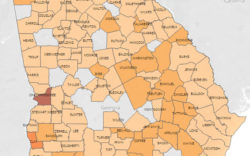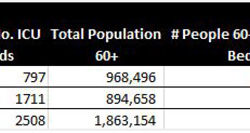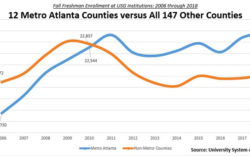Ordinarily, the Georgia General Assembly is a shoo-in for top honors in the Best Free Show in Town competition. This year it’ll have stiff competition from the Republican-on-Republican death cage match between incumbent GOP Governor Brian Kemp and former President Donald J. Trump’s handpicked lapdog, ex-U.S. Sen. David Perdue.
I wouldn’t place a bet on this race right now if my life depended on it, but I would wager that it’ll bring into sharper focus than ever before the schism between Republicans in blood-red rural Georgia and those in metro Atlanta’s purplish suburbs and exurbs.
Picture the Georgia GOP as Humpty Dumpty. The one thing we know for sure is that the Kemp-Perdue match will pull him off the wall and bust him into at least two big pieces. The question is whether either candidate can put him back together again.
The differences in these two wings of the party are profound. Rural Georgia Republicans are among the poorest and least well-educated voters on the planet. Their suburban and exurban GOP cousins are pretty much the exact opposite: highly-educated, economically productive and very affluent. It was among this latter group that Trump arguably lost Georgia in the 2020 presidential race.
Trying to parse those voting blocs right now strikes me as an exercise in futility. My first impulse would be to give Perdue the edge, thanks almost entirely to the Trump endorsement. It was, after all, a Trump endorsement in 2018 that doomed former Lt. Gov. Casey Cagle’s then-frontrunning gubernatorial bid and all but handed the Republican nomination to Kemp. How can Kemp expect to do without that Trumpian support the second time around?
That line of thinking might hold true in rural Georgia, but the ‘burbs are different. I write this without the benefit of any polling data, but I have to wonder if the stink of Trump still clings to Perdue in those climes—and whether Kemp might have the advantage there. I am no Kemp fan, but I think a fair assessment of his first term has to be that it hasn’t been a total disaster. (Hey, my expectations are pretty low.) He’s chalked up some impressive economic development wins and has somehow managed to avoid embarrassing the state on any kind of regular basis.
OK, OK, he signed SB 202 surrounded by a group of mostly over-fed old white guys while sitting under a painting of a former slave plantation, but—let’s face it—that won’t hurt him with most Republicans. I wouldn’t be surprised to see him use it in a campaign ad—especially in the aforementioned rural regions of the state.
One presumed advantage for Kemp is that he’s built up a $12 million campaign war chest. I say “presumed” because recent history tells us a fat bank account is no guarantee of political success in Georgia (see: Barnes, Roy, 2002). On top of that, he’s now apparently sitting on a multi-billion dollar state surplus and wants to spend about $1.6 billion in “tax refunds” to all Georgians.
It’s unclear whether he’ll have to report those refunds as campaign expenditures, but, frankly, it’s also unclear whether they’ll do him much political good. Trump’s name was printed on hundreds of billions of dollars in COVID stimulus checks issued in the spring of 2020, and he promptly went on to lose re-election a few months later.
His successor, Joe Biden, seems to have fared little better with his own stimulus checks (although he did not have his name printed on the checks). Based on recent polling data, it’s far from clear that his stimulus program did him much political good.
If the Trump and Biden experience is any guide, Kemp’s taxpayer refunds will be largely forgotten within a few weeks after the checks go out.
For what it’s worth, I think Kemp missed a Nixon-to-China moment. With a few billion spare bucks lying around, why not put it to strategic use and plow it into hardwiring rural Georgia for broadband internet service? Broadband has, after all, been held out by many Republicans as key to rural Georgia’s salvation, and that kind of initiative would have created hundreds if not thousands of jobs and helped build a foundation for economic development in the parts of the state that need it the most.
This column originally appeared at Trouble in God’s Country and is reprinted with permission.
Like what you just read? Support Flagpole by making a donation today. Every dollar you give helps fund our ongoing mission to provide Athens with quality, independent journalism.










